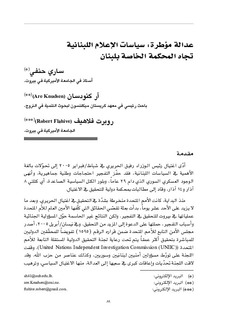Framed Justice: The Politics of Media for the Special Tribunal for Lebanon
Journal article, Peer reviewed
Date
2015-09-01Metadata
Show full item recordCollections
- Publications [1488]
Original version
in Arab Journal for Political Science vol. 45-46 pp. 89-109Abstract
[English abstract] The Lebanese media landscape is widely acknowledged to be a battleground for privatized outlets aligned with political elites. Each outlet vies for hegemony in a crowded and competitive marketplace of competing narratives. Lebanese outlets may, on occasion, find points of agreement. But issues of political power, national identity, and policy prompt contestation and conflict in this deeply divided nation. Lebanese media thus presents a paradox. Media outlets are among the freest in the Arab region with a wide spectrum of views represented. Yet outlets tend to be highly partisan. This configuration ensures media pluralism at a cost: the predominance of agenda-driven media outlets that reflect sectarian and political affiliations. To this end, this article studies the newspaper coverage of a highly divisive event: The Special Tribunal for Lebanon (STL) prosecuting the assassination of former Prime Minister Rafik Hariri. Analyzing the media coverage – 232 news articles and op-eds in five Lebanese newspapers over a three-year period (2009–11) – the article uses media framing theory, content analysis, and discourse analysis to unpack the newspapers coverage of the tribunal. The article demonstrates that the newspapers served as political messaging tools and highlight the active framing mechanisms in the media’s coverage of the tribunal.
Series
Arab Journal for Political Science vol. 45-46Arab Journal for Political Science vol. 45-46
